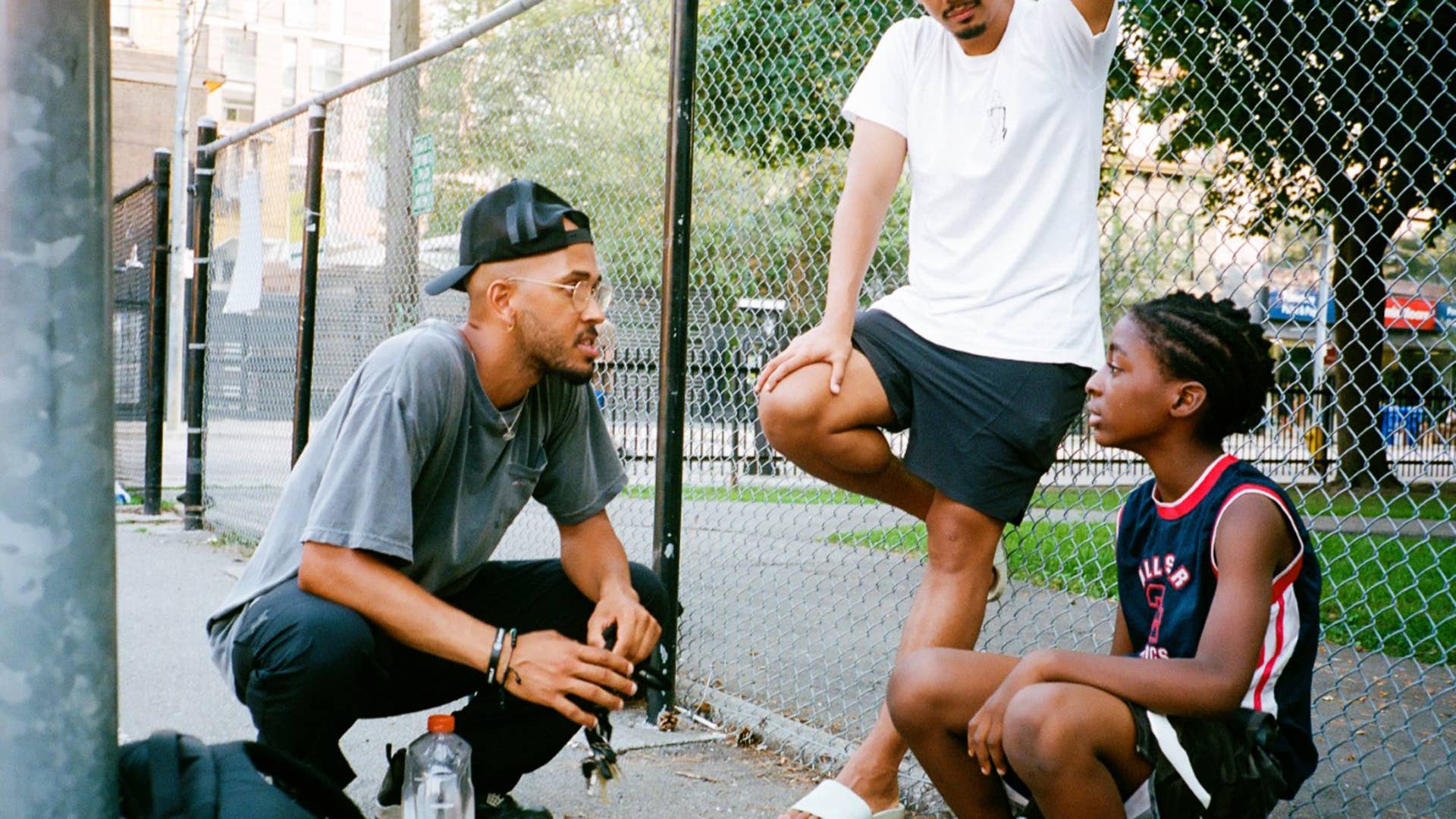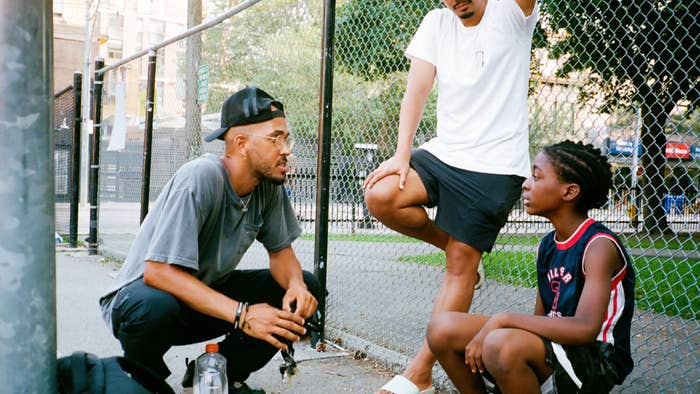
Desire inspires motivation, and at times, self-destruction. But in the grand scheme, it’s a dance between one of the two. Enter Jamal Burger, a Toronto photographer turned non-profit starter who comes from that in-between. He reminds us, throughout a minute-by-minute conversation without explicitly saying so, that he’s the avatar of two paths: from scrappy, Toronto youth who flirted with bad decisions out of a need, to scrappy, Toronto-based photographer now giving children what they equally need; self-confidence and of course, motivation.
“I was a quiet kid, and I loved Allen Iverson, Lebron James, and Michael Jordan. Sneakers became my way of showing people who I loved without having to say a thing,” says Burger before the caveat. “Of course, I didn’t have the money for them.”
The sneaker part of Burger’s story is on well-trodden ground. He did what he did. In Toronto’s Regent Park neighborhood, he turned to the street practice of acquiring sneakers by any means over buying them; lift a thing, sell the thing, and purchase the new sneaker things. For Burger, a great pair of kicks was the bridge to a better life and a greater sense of self. And when you’re young, without money, and a person of colour, in a system that seems designed for your failure, well, that becomes the game.
Those early years—mentorships through Pathways to Education, to the shoes that provided a funding gateway into photography—largely informed Burger’s current one. He’s now the co-founder of a creative agency Tier Zero and has since worked with the likes of the Toronto Raptors, adidas, and Nike; the sneakers he once coveted as an impossible-to-attain thing are now being freely given by the brands themselves.
Remember: This isn’t a story about how Burger got some new kicks. Just as he was attaining this notoriety in perk form, he knew that he was no longer the person who needed new shoes. Burger, along with his fellow sneaker lovers and friends, Christian Epistola and Mac Madrigal, would later found Kickback. Since 2017, the non-profit has collected over 10,000 pairs of shoes, giving out 4000 to charity while providing over 6,000 pairs of shoes to children around the world. And they’ve found ways to provide workshops and events centered around a younger generation.
With the current year coming to a close, Burger and his team will be running a sneaker auction and gala from now until Dec. 10 (at 50 Ossington Ave. in Toronto) to showcase the best Kickback moments over the last year—an experience he’s been more than happy to showcase and talk about. The interview, edited for clarity and length, is below.
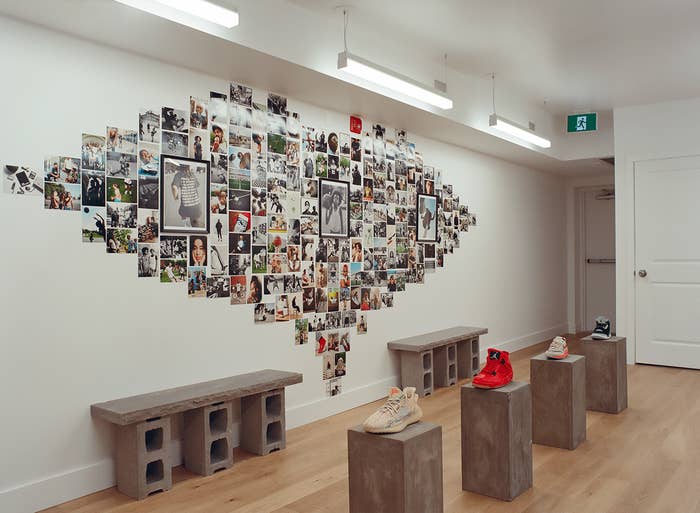
With all the work that you’ve been doing, I want to ask how you’ve been managing things over all the craziness we’ve experienced.
Man, if I were to describe the past year and a half, it would be a case where you had all this weight on your shoulders and you were being grounded from where you stood. Some people remained standing and some fell over the heavier weight. It comes from a social, emotional, and a racial space. But I’ve learned a lot. I’ve learned to slow down and be positive with the work. I don’t have to see everything as a problem in order to find solutions. But I also know that I have to possess a certain level of focus to accomplish all this without letting it kill me to the point of focusing without reason. That sort of focus doesn’t amount to anything.
Some of that focus has been on Kickback, and you’re still channeling empowerment with sneakers as a platform. But remind me about your own relationship with shoes growing up. How does it continue to inform this cause?
It directly informs everything I do today. For me, it goes back to the kid I was at 13 or 14 years old. I was on the brink of going down a very different path with sneakers being the entry point. Back in the day, I needed shoes to play ball and go to high school—you needed black shoes to attend. When I found out that I needed these particular shoes for my first day of grade nine, I went ahead and robbed some shit. Luckily, the moment I was caught by police and driven home in a police car wasn’t for something as serious. It was for trying to steal a book. [Laughs.] It was the first time I discovered one that actually related to me. My other friends who got caught stealing sneakers over books were brought back home in police cars far later. And they got caught up in these low-hanging fruits that were offered in our blocked-off regions and neighborhoods that were set up for failure.
When it comes to sneakers, I was a quiet kid, and I loved Allen Iverson, Lebron James, and Michael Jordan. Sneakers became my way of showing people who I loved without having to say a thing. Of course, I didn’t have money for them, but I loved them and always felt like I needed them by any means necessary. I went through a period of having 9 or 10 friends to steal shit with and make sure I had the shoes I needed to do what I needed to do. I’m really the only one that hadn’t gone to jail, died, or faced the consequences of something that would have caused irreparable damage. It’s crazy how I was lucky enough to avoid that trouble.
I definitely feel that.
Yeah, I’m really lucky. I had to then sell the sneakers I collected in high school to do the things that I began to care about such as going to university when I didn’t have the funds for it. The process was, I did all this shit to acquire sneakers, and here I was using these shoes to get me through school, which I also had to sell to get into photography. Then I got into a position where all of these brands were sending me sneakers because I have X amount of followers. That’s when I had a eureka moment of knowing that they were giving it to the wrong person. So, for me, it took me to the place of saying, I’m going to take everything they give me, do the same with my friends, and decide to give them to these kids. And specifically, give them to the kids in my neighborhood to start out. I consider myself successful if one kid doesn’t feel the need to steal to go to a school this year, because the moment they open themselves to a different possibility, anything can happen.
At the root of it all. People don’t just start breaking into houses out of nowhere. They do their test runs with the things they need going for $100 to $300 dollars. I wanted to find an avenue for them to stop that, but also make sure that kids can go to school feeling confident. It was a process of hoping that the kids would actually learn something about having new kicks. So now, we’re trying to attach a sneaker to a lesson each and every time. We’ve been able to give out 6000 pairs to kids around the world, and it’s been beautiful man.
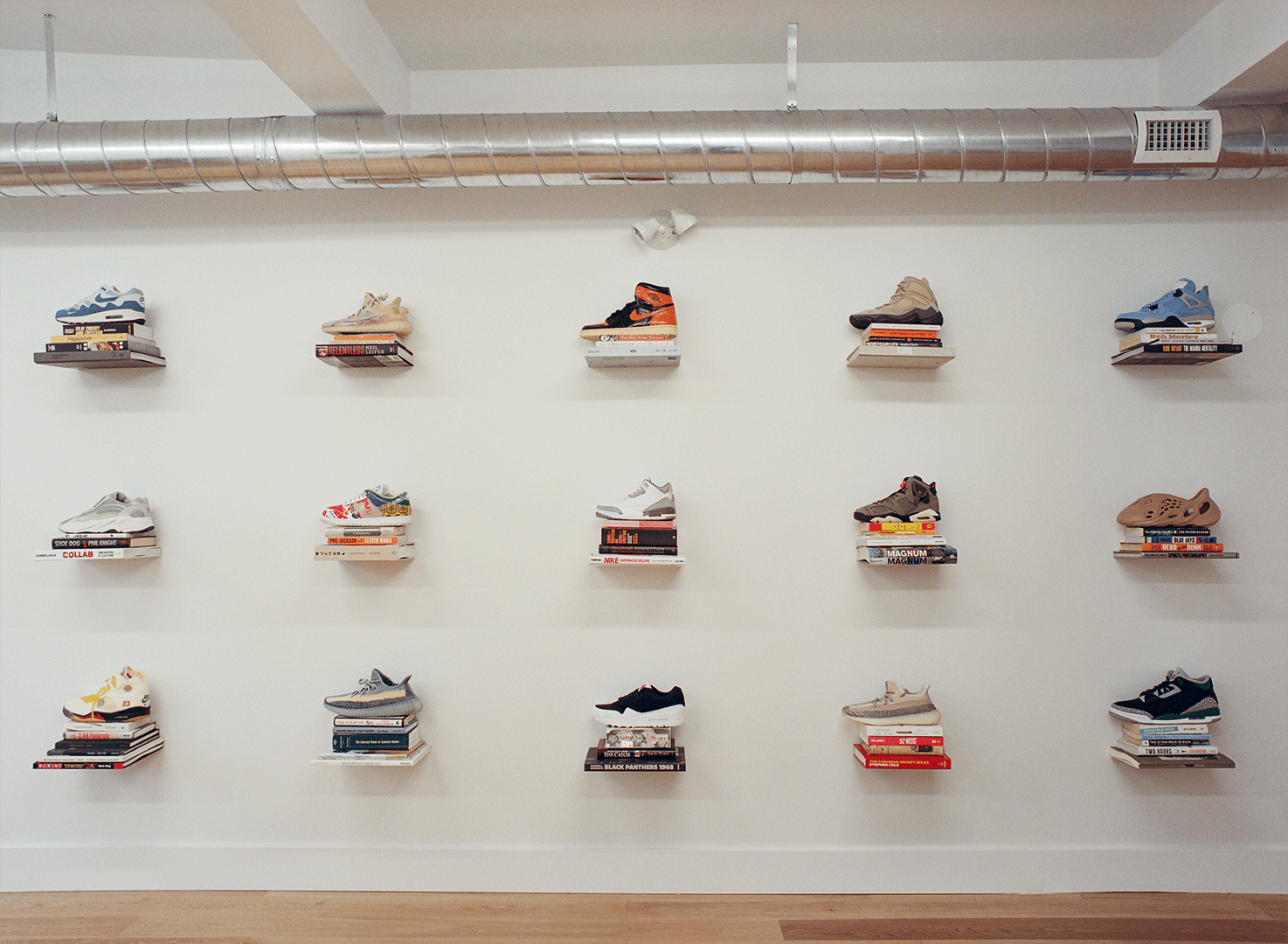
I gotta ask. Based on your background, career, and what you’ve experienced, what does the word empowerment actually look like to you?
Empowerment is representation to me. When you see someone that looks like you, coming from the same place, that connects and lets you know that you can do this and still be who you want to be. Empowerment to me is not just about echoing it, but about being able to provide the means to actually make things happen. There’s a difference in that over just telling others that I did this successful thing and that they can do it too. And it’s true that some people may be so entrenched in their experience that they may not be listening or be able to entertain your offer. But with that in mind, we’re trying to have these kids be the leads. There are the kids who can chase after a vision they see themselves in without too much help. But there are others who will need to see one of us, find out that we shot for the Raptors, and then go from having a conversation with someone they’re comfortable with to having a seed planted within them.
“Through working with Kickback, I came to find out that it literally does start in your backyard. That’s where all your emotions, dreams, and aspirations are. It’s where you’re grounded.”
It’s one thing to have this vision from the start, but it’s another to feel it. When did you truly feel that Kickback was special?
Man. It was this year actually when the first kid we ever mentored had his own program. He was responsible for 30 to 40 youths a week. He’s younger than I was when I started this and he’s already running a program that’s more organized than anything I’ve ever done when I was his age. It went on to show me that it’s actually working and that we’re really building multiple leaders that have the infrastructure and support to be better than I ever was at that stage in my life. It’s almost like these kids represent multiple versions of me.
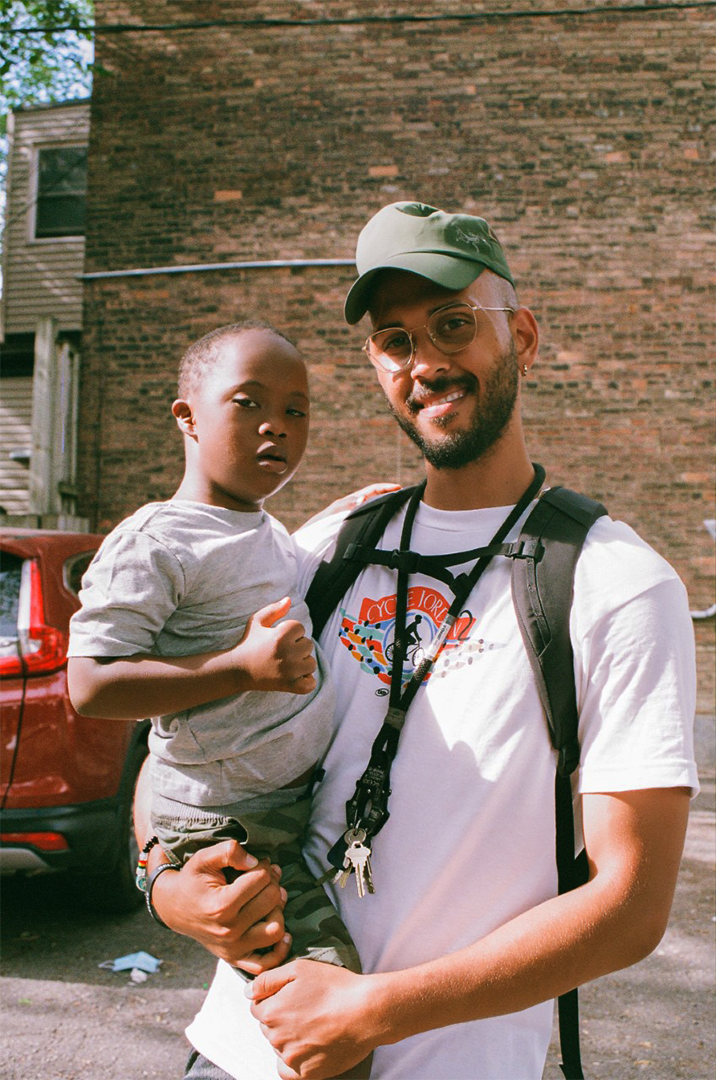
So, with the auction, it’s obviously focused on some of the best moments of this year. But I’d like to know about your own measure of the great moments.
We took kids from neighborhoods that don’t necessarily get along to Vancouver. And by the end of the trip, they were able to express the respect they had for one another and the love of the energy that was being given. That was powerful. Putting these kids on a plane was powerful. Increasing female participation this year was powerful. There’s also a ride we do every year for a young man with Down syndrome named Jordan Isaac, and he makes everyone so happy because he’s defied the odds. It inspires everyone who participates with Jordan to defy their own odds. In the first year we raised $5000 that went towards speech therapy, and this year, he’s talking in front of everyone. 2021 was just super special. We’re in a place now where I’m just excited to do it all again.
Being able to pay it forward in this grand way must be an amazing feeling, as it should be. It makes me wonder how Kickback may have impacted your own life or outlook.
Honestly, running a nonprofit organization like Kickback taught me that you really have to prioritize your personal mission. It’s down to that thing that matters to you the most, and then you have to figure out how to make it work. You know that whole cliche thing about how it always starts in your backyard? I never believed that shit originally. When I was taking photos and moving around as a photographer, I got to do so much outside of Toronto that gave me this persona as a person who couldn’t be messed with. But through working with Kickback, I came to find out that it literally does start in your backyard. That’s where all your emotions, dreams, and aspirations are. It’s where you’re grounded.
Is there anything else you’d like to add?
Actually, yeah. I had a conversation with a friend that inspired me to say that it’s important for people with big dreams, who are from Toronto to stay in Toronto. You can leave and do a ton in other places, but never forget that this is always home. I don’t feel you can leave for such a long period of time, come back, and still understand what’s really going on. You need to have a regular cadence in this city because I feel as if there’s this idea of a ceiling that all creatives, entrepreneurs, and artists are trying to break through while trying to break it together. But we need all of the human power to do that. The talent we have in Toronto is so important. I understand the need to leave, but for me personally, I always come back and feel proud to be here.

